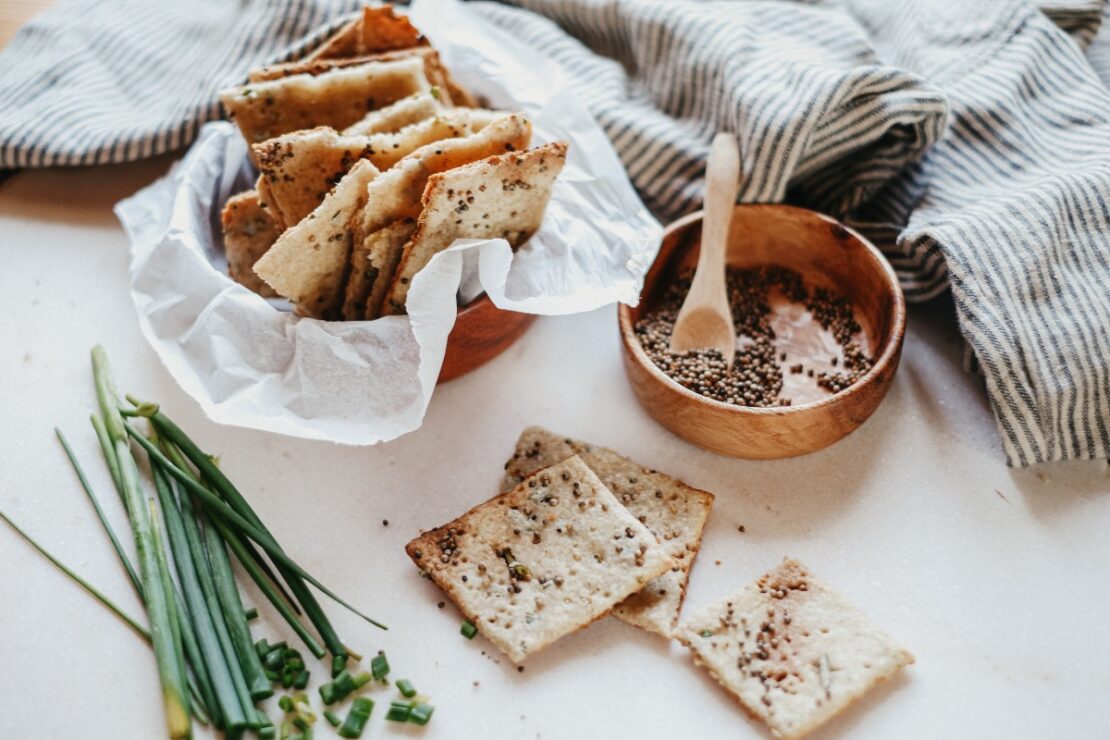
Homemade Crackers With Scallions and Black Mustard Seeds
Until a couple of months ago, I never thought to make homemade crackers. Crackers were one of those things that I only enjoyed when store-bought. However, making crackers in your own kitchen is surprisingly easy and fun—also, you can get creative with the ingredients and you always know exactly what goes into your savory snacks. This recipe features almond flour, scallions, and black mustard seeds, and can easily be made gluten-free. Let’s first discuss the key ingredients in these flavorful snackable delights.
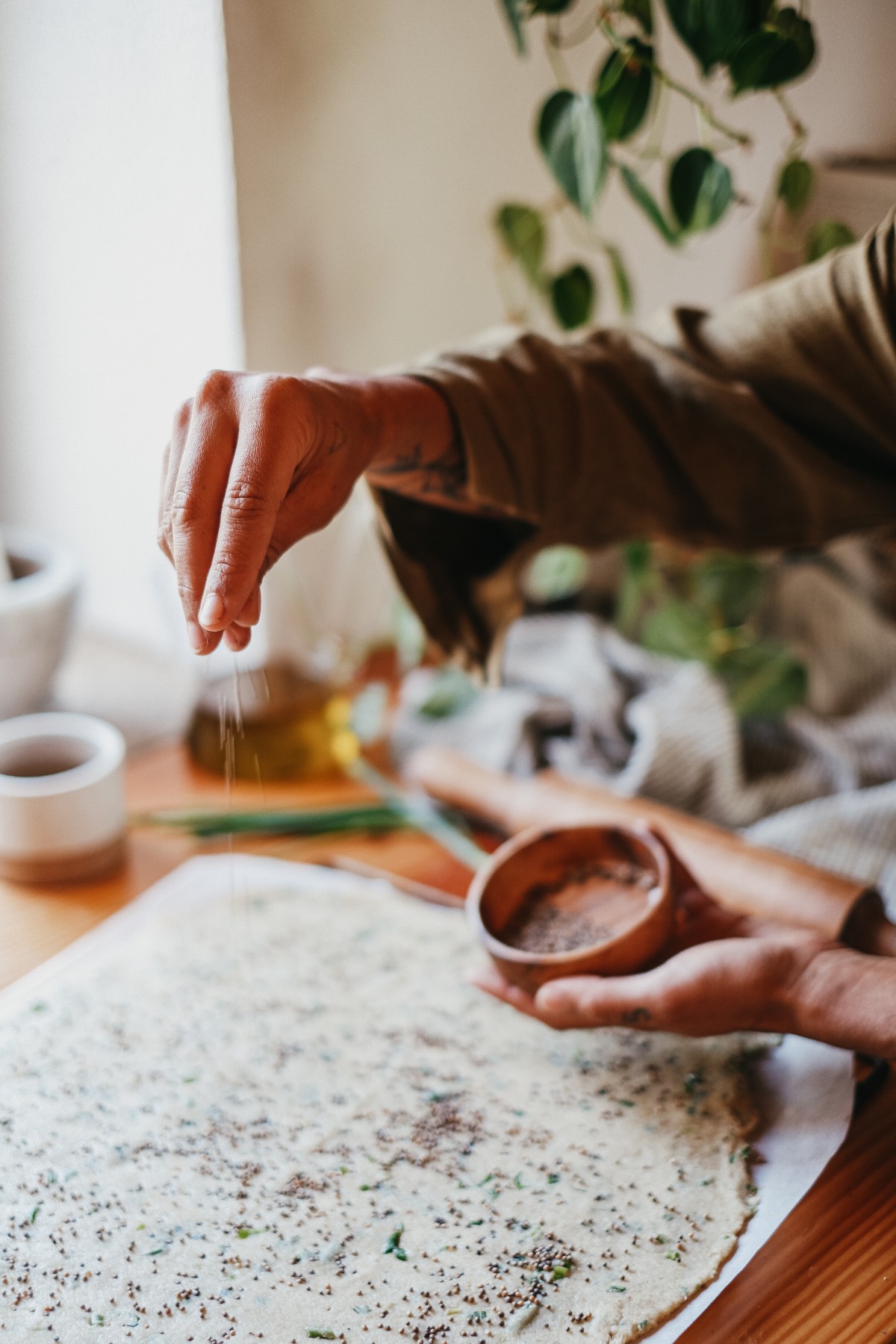
Main Ingredients
Almond Flour
I used a combination of all-purpose flour and almond flour to make these crackers. If you wish to make these crackers gluten-free, choose a gluten-free all-purpose flour. According to Ayurveda, almonds have a sweet taste, a warming energy, and an overall nourishing effect. They are also considered to be a demulcent and help build ojas (vigor/vitality) (Frawley & Lad, 2001). In addition, almond flour offers beneficial fats, protein, fiber, and a range of minerals and vitamins, such as calcium, iron, and vitamin E. The almond flour in these homemade crackers boosts heartiness and nutritional value and adds nuance to the texture.
Black Mustard (Brassica nigra) Seeds
Black mustard seeds, sometimes called brown mustard seeds, add crunch, color contrast, and texture to these crackers. In addition, these little seeds are warming and have an overall purifying effect (Lad & Lad, 1997). Mustard seeds benefit digestion and boost agni by acting as a carminative (Frawley & Lad, 2001). Carminatives assist digestion by easing spasms, dispelling gas, and calming bloating (Groves, 2016).
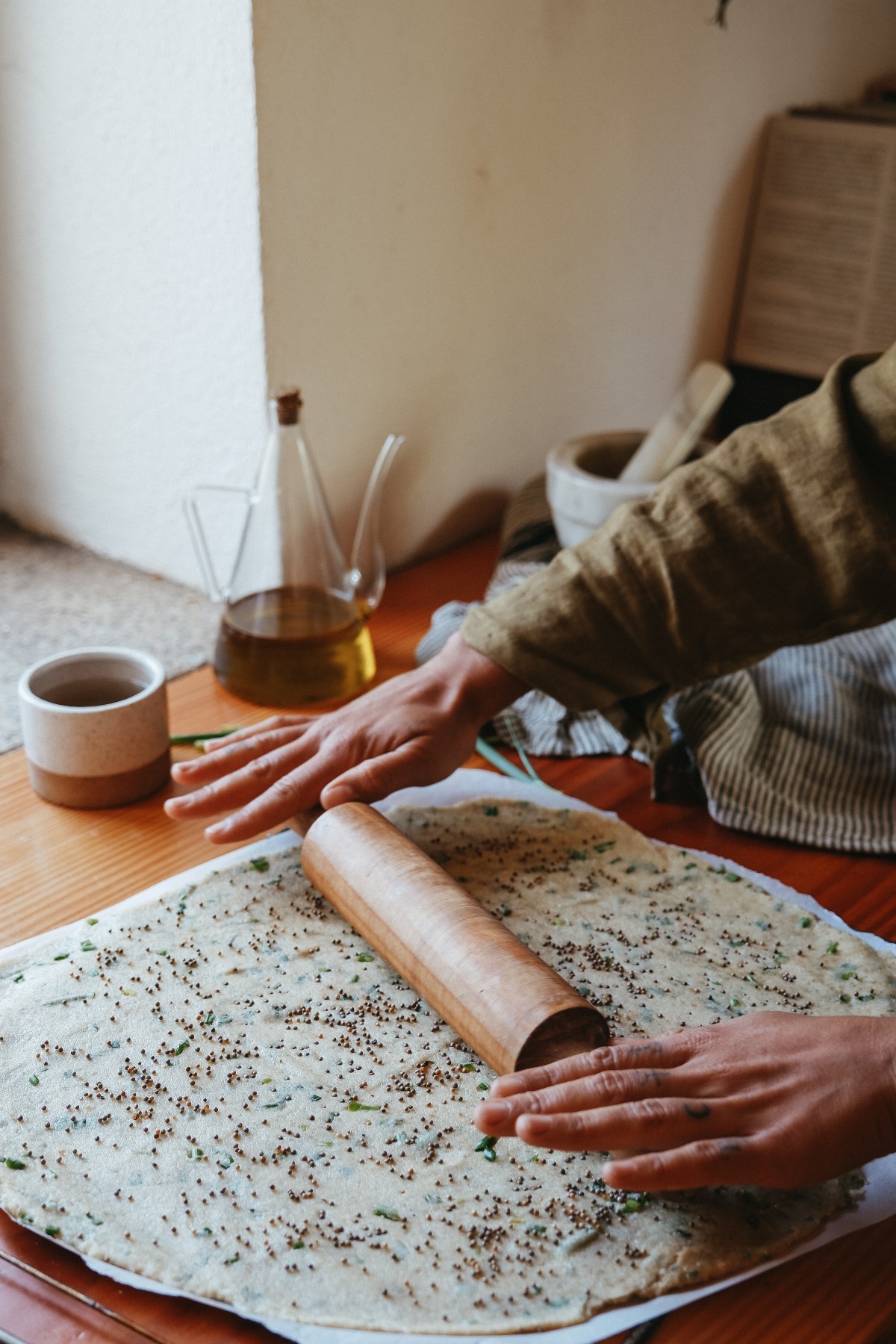
Scallions (Allium fistulosum)
According to MD and ayurvedic practitioner Akil Palanisamy (2015), “Green onions (also known as scallions) are the closest to wild onions and have an astonishing 140 times more phytonutrients than common white onions” (p. 67). Also, consuming sulfur-rich foods such as scallions (and other Alliums like garlic, onion, shallots, and leeks) supports Phase 2 liver detoxification—the process by which wastes are reduced to metabolites that can then be eliminated from the body via the urine or stool (Palanisamy, 2015). Furthermore, Ayurveda considers onions (and by extension, scallions) to be warming and nourishing when cooked (Lad & Lad, 1997). In this homemade cracker recipe, I used ½ cup of diced scallions and the flavor comes through in a potent and pleasing way (as long as you like green onion!).
Recipe Energetics
Given that these crackers feature black mustard seeds, almond flour, and scallions, all plants with warming energetics, the crackers have an overall warming energetic profile, making the recipe a great choice for early spring or cooler times of the year. These crackers are suitable for those with a vata or kapha constitution but are too warming to be regularly consumed by those with a pitta constitution or pitta imbalance. That said, you can use this recipe as a springboard—try mixing up the herbs and seeds for varying flavors and energetic profiles.
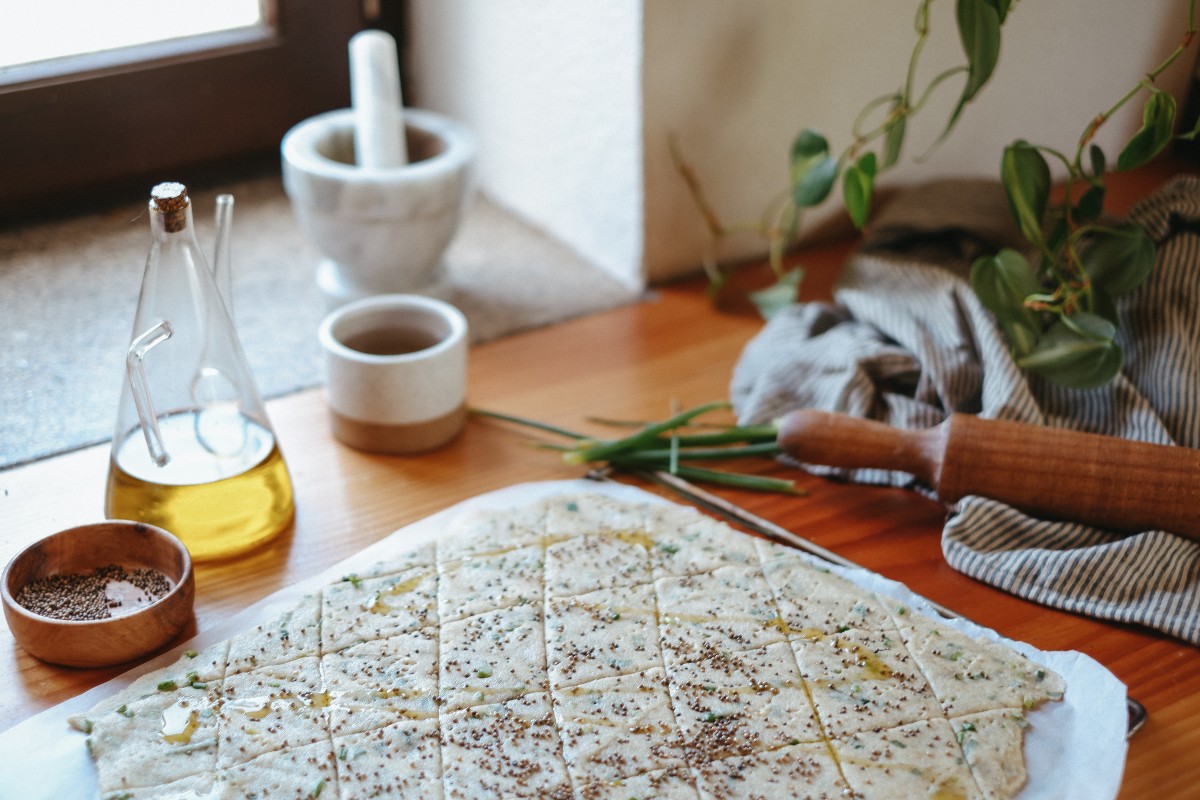
Homemade Crackers with Scallions and Black Mustard Seeds
If you enjoy Chinese scallion pancakes, you will love these homemade crackers made with scallions and black mustard seeds. Drizzle with a bit of sesame oil before popping in the oven to truly replicate the green onion pancake taste experience. Hearty and pungent, these crackers are flavorful enough to stand on their own. Or, enjoy them with a mild, creamy cheese such as brie, or alongside a hot bowl of soup. Yield: approximately 75 2-inch square crackers.
2 cups almond flour
1 cup all-purpose flour (gluten-free or conventional)
1½ teaspoons salt
⅓ cup olive oil
⅔ cup water
½ cup scallions (Allium fistulosum), finely chopped
Black mustard (Brassica nigra) seeds for topping
Toasted sesame oil for drizzling
- Mix all ingredients in a large mixing bowl.
- Let dough sit for 15 minutes at room temperature. Preheat oven to 375 degrees F.
- On a piece of floured parchment paper, roll dough out until it is 1/16 inch thick (getting the dough thin enough is key!). Dust the rolling pin with all-purpose flour as needed.
- Sprinkle evenly with mustard seeds.
- Use a rolling pin to press seeds into the dough, and then repeat, adding more seeds.
- Lightly drizzle with toasted sesame oil.
- Punch holes in the dough across the entire surface using a fork (this will prevent dough from rising and will ensure that the crackers are crispy when baked). Using a pizza cutter or very sharp knife, cut dough into 2-inch squares.
- Transfer parchment paper with dough onto a cookie sheet.
- Bake at 375 degrees F for approximately 12 minutes. Crackers should be golden brown around the edges.
- Remove from oven and let cool.
To Use:
After crackers have cooled, store in an airtight container, such as a cookie tin. These crackers are most flavorful when eaten fresh but will keep for several days.
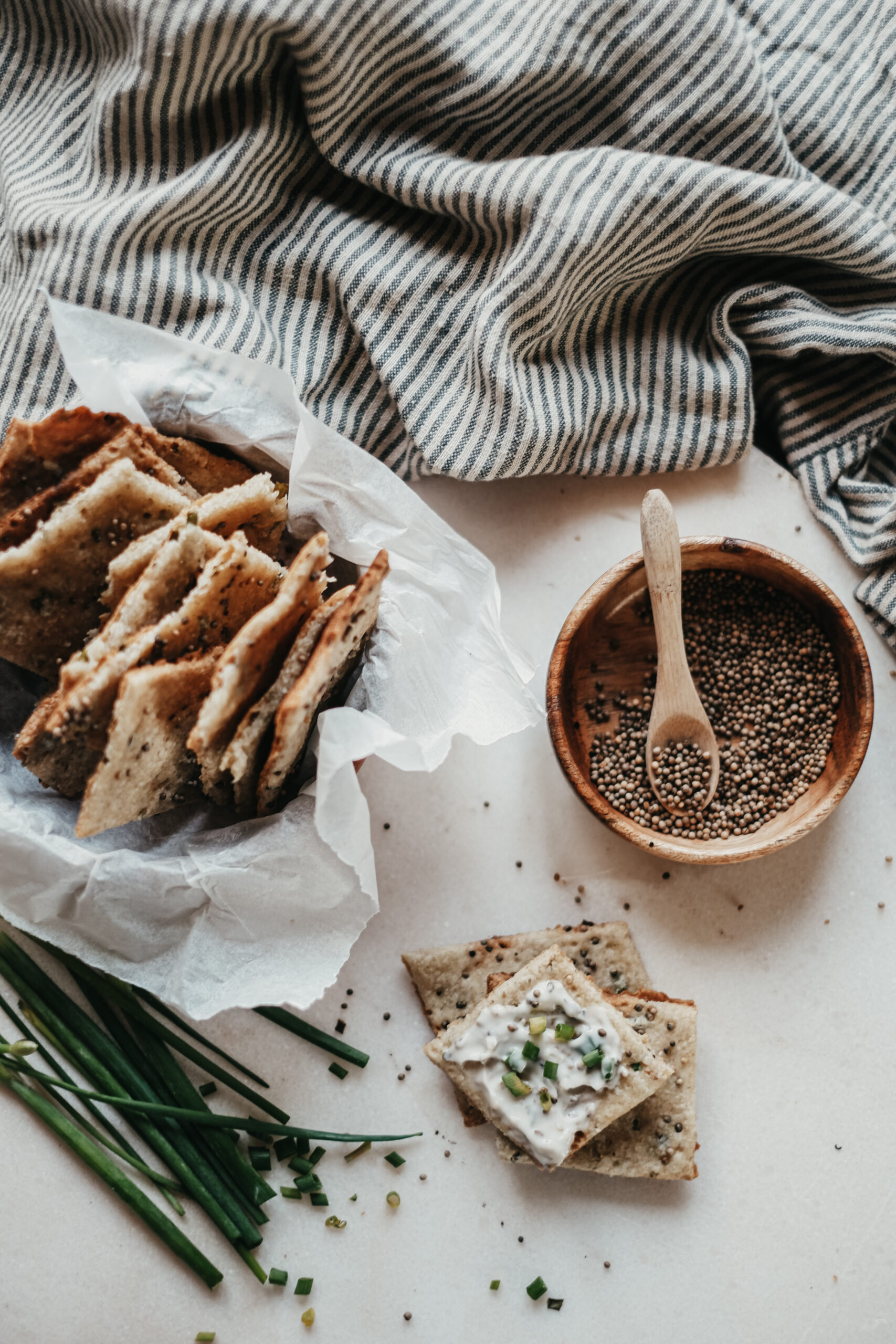
In Closing,
After trying this recipe, you may wish to create your own variation(s). Consider substituting white or black sesame seeds for black mustard seeds. Additionally, you can try adding or substituting other fresh garden herbs such as rosemary (Salvia rosmarinus), thyme (Thymus vulgaris), and dill (Anethum graveolens). Make these flavorful crackers the next time you are hosting or attending a lunch or dinner gathering and serve on a cheese or snack platter—easy to make, yet original, your friends and family will be impressed with your artisanal homemade crackers.
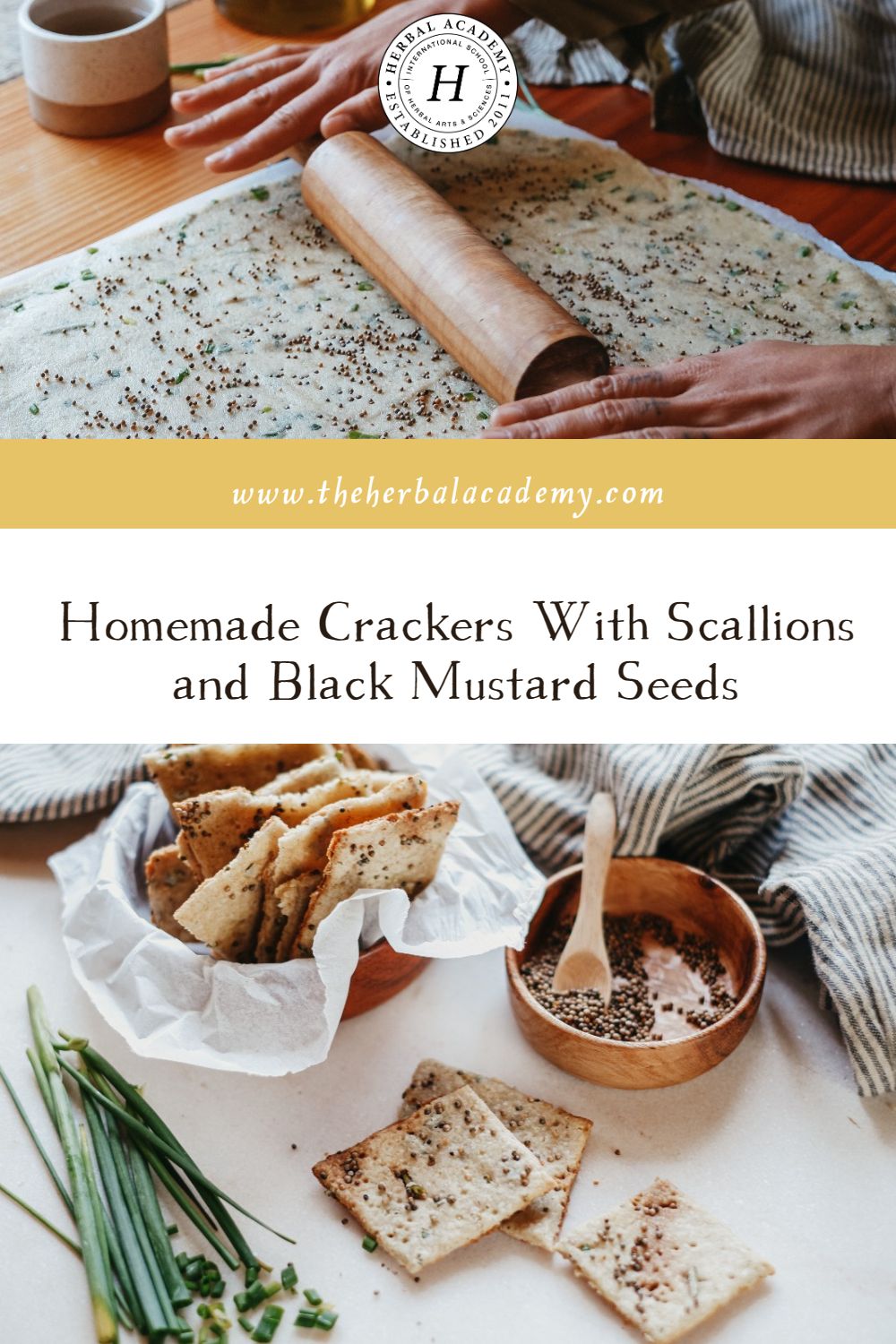
REFERENCES
Frawley, D., & Lad, V. (2001). The yoga of herbs. Lotus Press.
Lad, V., & Lad, U. (1997). Ayurvedic cooking for self-healing (2nd ed). The Ayurvedic Press.
Groves, M.N. (2016). Body into balance: An herbal guide to holistic self-care. Storey Publishing.
Palanisamy, A. (2015). The paleovedic diet: A complete program to burn fat, increase energy, and reverse disease. Skyhorse Publishing.








